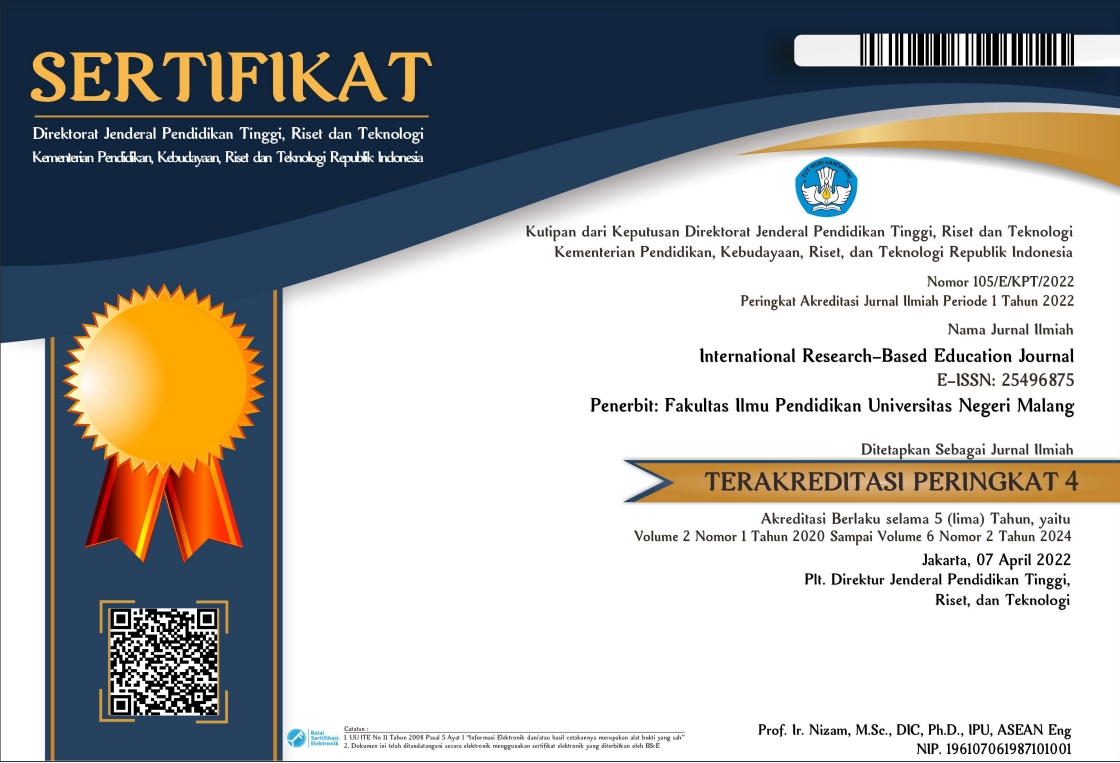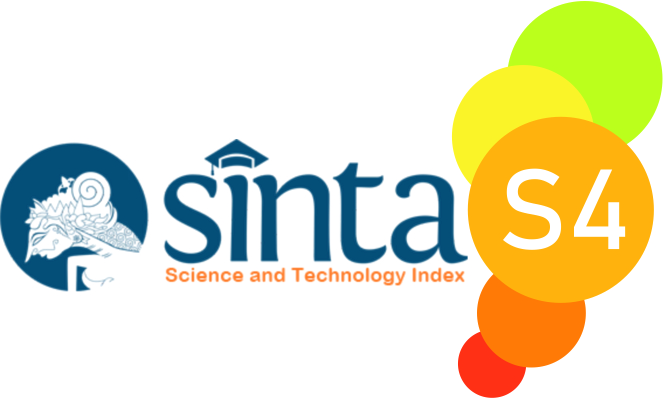The Power of Gamification: How Kahoot! Transforms Motivation and Learning in Primary Science Education
Abstract
Keywords
Full Text:
PDFReferences
Candan, F., & Başaran, M. (2024). A meta-thematic analysis of using technology-mediated gamification tools in the learning process. Interactive Learning Environments, 32(7), 3332–3348. Scopus. https://doi.org/10.1080/10494820.2023.2172589
Chen, C.-C., & Tu, H.-Y. (2021). The Effect of Digital Game-Based Learning on Learning Motivation and Performance Under Social Cognitive Theory and Entrepreneurial Thinking. Frontiers in Psychology, 12. Scopus. https://doi.org/10.3389/fpsyg.2021.750711
Creswell, J. W., & Creswell, J. D. (2018). Research design: Qualitative, quantitative, and mixed methods approaches (Fifth edit). SAGE.
DeVellis, R. F., & Thorpe, C. T. (2021). Scale development: Theory and applications. Sage publications.
Etikan, I. (2016). Comparison of Convenience Sampling and Purposive Sampling. American Journal of Theoretical and Applied Statistics, 5(1), 1. https://doi.org/10.11648/j.ajtas.20160501.11
Field, A. (2018). Discovering statistics using IBM SPSS statistics (5th edition). SAGE.
Fraenkel, J. R., Wallen, N. E., & Hyun, H. H. (2019). How to design and evaluate research in education (Tenth Edition, International Student Edition). McGraw-Hill Education.
Huang, C.-H. (2021). Explore the Effects of Usefulness and Ease of Use in Digital Game-Based Learning on Students’ Learning Motivation, Attitude, and Satisfaction. 366, 26–39. Scopus. https://doi.org/10.1007/978-3-030-78448-5_2
Hung, C.-Y., Sun, J. C.-Y., & Liu, J.-Y. (2019). Effects of flipped classrooms integrated with MOOCs and game-based learning on the learning motivation and outcomes of students from different backgrounds. Interactive Learning Environments, 27(8), 1028–1046. Scopus. https://doi.org/10.1080/10494820.2018.1481103
Licorish, S. A., & Lötter, A. L. J. (2022). When Does Kahoot! Provide Most Value for Classroom Dynamics, Engagement, and Motivation?: IS Students’ and Lecturers’ Perceptions. Journal of Information Systems Education, 33(3), 245–260. Scopus.
Lin, W.-C., Ho, J.-Y., Lai, C.-H., & Jong, B.-S. (2014). Mobile game-based learning to inspire students learning motivation. 2, 810–813. Scopus. https://doi.org/10.1109/InfoSEEE.2014.6947779
Liu, H., Wu, Z., Lu, Y., & Zhu, L. (2023). Exploring the Balance between Computational Thinking and Learning Motivation in Elementary Programming Education: An Empirical Study with Game-Based Learning. IEEE Transactions on Games, 15(1), 95–107. Scopus. https://doi.org/10.1109/TG.2022.3143701
Pellas, N. (2024). Effects of Kahoot! On K-12 Students’ Mathematics Achievement and Multi-Screen Addiction. Multimodal Technologies and Interaction, 8(9), 81. https://doi.org/10.3390/mti8090081
Rashid, N. A. M., & Noor, N. M. (2023). Enhancing Pre-Schoolers’ Learning Motivation in Jawi Subject Through Game-Based Learning Application. 2023-October, 426–434. Scopus. https://www.scopus.com/inward/record.uri?eid=2-s2.0-85179013158&partnerID=40&md5=97b34da1c18ae14a3b6f2cd05b8dbcff
Rayan, B., & Watted, A. (2024). Enhancing Education in Elementary Schools through Gamified Learning: Exploring the Impact of Kahoot! On the Learning Process. Education Sciences, 14(3). Scopus. https://doi.org/10.3390/educsci14030277
Ryan, R. M., & Deci, E. L. (2000). Self-determination theory and the facilitation of intrinsic motivation, social development, and well-being. American Psychologist, 55, 68–78. https://doi.org/10.1037/0003-066X.55.1.68
Thi Van Pham, A., Thi Thao Ho, N., & Duy Nguyen, L. (2021). An Investigation into Students? Motivation and Learning Effectiveness in Gamified Learning Experiences via Kahoot! At a Higher Education Institution in Vietnam. 5–10. Scopus. https://doi.org/10.1145/3481056.3481066
Tsihouridis, C., Batsila, M., Vavougios, D., & Tsichouridis, A. (2023). “In Vivo” Science Learning—Academic Teaching Through a Game-Based Process. 634 LNNS, 151–162. Scopus. https://doi.org/10.1007/978-3-031-26190-9_15
Wang, K., Liu, P., Zhang, J., Zhong, J., Luo, X., Huang, J., & Zheng, Y. (2023). Effects of Digital Game-Based Learning on Students’ Cyber Wellness Literacy, Learning Motivations, and Engagement. Sustainability (Switzerland), 15(7). Scopus. https://doi.org/10.3390/su15075716
Yeh, Y.-T., Hung, H.-T., & Hsu, Y.-J. (2017). Digital Game-Based Learning for Improving Students’ Academic Achievement, Learning Motivation, and Willingness to Communicate in an English Course. 560–563. Scopus. https://doi.org/10.1109/IIAI-AAI.2017.40
Zheng, Y., Zhang, J., Li, Y., Wu, X., Ding, R., Luo, X., Liu, P., & Huang, J. (2024). Effects of digital game-based learning on students’ digital etiquette literacy, learning motivations, and engagement. Heliyon, 10(1). Scopus. https://doi.org/10.1016/j.heliyon.2023.e23490
DOI: http://dx.doi.org/10.17977/um043v7i1p85-97
Refbacks
- There are currently no refbacks.

This work is licensed under a Creative Commons Attribution-NonCommercial-ShareAlike 4.0 International License.










1.png)


